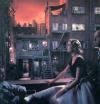This past fall, Don't Worry Darling was the most talked about movie to be released.
And almost none of it was due to on-the-screen content.
Olivia Wilde got served custody papers at a promotional talk at CinemaCon. Shia LaBeouf was fired or quit, depending on who you ask, amid some conflicting reports about his on-set behavior. Harry Styles may or may not have spit into Chris Pine's lap. Florence Pugh and Wilde reportedly clashed on set, and Pugh bowed out of most of the press tour due to this tension. And that conflict might have been born from the fact that Wilde and Styles were having an affair on set that led to them beginning to date, and Wilde may have not liked the fact that Pugh and Styles had so much chemistry.
...phew.
Don't Worry Darling was a mess of a film with an even messier press tour. It dominated the headlines despite being a legitimately bad movie. And...it also made enough money at the box office to break even. We couldn't help but buy tickets, either in spite of or because of the drama.
There's something magical about the movies and Hollywood at large. Despite all the back-room stuff we know goes on, despite the scandals, we can't help but look at it. Like any good car crash, it attracts our attention because of the mess it is.
Babylon is a film about this car crash effect. It centers its attention on 1920s Hollywood at the inflection point between silent films and talkies, but it is really a broader picture of the film industry for all times. Damien Chazelle has already made a film about Hollywood and the magic of moviemaking before, 2016's smash hit musical La La Land (which lands a spot in my top 10). So why is he already revisiting this subject matter?
Let's head back a bit, like, a big bit: in the Garden of Eden, a man and woman are sold a bill of goods for what will happen when they eat fruit from a tree they aren't supposed to even touch. A serpent tells them that they've got it all wrong: they will instead become like God himself, and their eyes will be opened, knowing both good and evil. The man and the woman then desire this fruit so much to the point where they eat it. That bill of goods ends up being misleading: the man and woman realize that their eyes were opened, but not to good and evil but to shame and guilt.
La La Land is that false bill of goods; it paints an optimistic picture of what aspirational filmmakers and actors want to be a part of and how they want to make something larger than themselves. Babylon is what that bill of goods actually is in the real life Hollywood: a place where you can rise and fall in the eyes of studio executives in the blink of an eye, where you can be on the way out through no fault of your own, where your image and its morality needs to shift wherever the money is flowing, where your replacement doesn't care about you as long as they get top billing. The scores of the two films (both composed by Justin Hurwitz) even reference each other with lifted chord progressions, feels, and prominent melodic cues. One of Babylon's central characters undergoes this realization during the course of the film: Manny (played by Diego Calva) states during the film's opening sequence that he wants to be a part of something bigger than himself, yet eventually after rising to prominence in the studio system becomes lost in trying to maintain his power as a producer and executive. Yet, despite all that, in the film's coda, an older Manny realizes that his time in such a broken system and messy place was all worth it to him because he fulfilled his dream: he made something bigger than himself.
Babylon carries these conflicting images of Hollywood as an idea and Hollywood as a reality throughout its entire gigantic three-hour runtime (the title card doesn't appear for thirty minutes, to give you an idea of its pacing). This makes it feel very, very messy and bloated almost the whole way through, particularly in its third act. But in reflecting on the film for a couple days, I see now that that inner turmoil, that chaos about which image is really true, is the entire point of this film. Babylon captures the difference between achieving your dream and discovering that your dream wasn't going to play out how you thought it might. It's a fun journey with a complicated destination, and that might make it tough to swallow at the end of a lot of chewing. But what it is able to do while being deliberately chaotic and self-conflicting makes it one of the more interesting films I've seen this year, and it proves that Damien Chazelle is still one of the most talented and inventive filmmakers working today.

